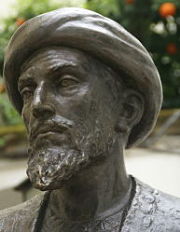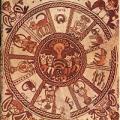160 - The Great Eagle: Maimonides
Posted on
The great Jewish thinker and legal scholar Maimonides, and the philosophical ideas in his Mishneh Torah and Guide for the Perplexed.
Themes:
Further Reading
• D. Davies, Method and Metaphysics in Maimonides’ Guide for the Perplexed (New York: 2011).
• J. Kraemer, Perspectives on Maimonides (Oxford: 1991).
• S. Pines (trans.), Guide of the Perplexed (Chicago: 1963).
• T. Rudavsky, Maimonides (Oxford: 2010).
• K. Seeskin (ed.), The Cambridge Companion to Maimonides (Cambridge: 2005).
• I. Twersky (ed.), A Maimonides Reader (New York: 1972).
Stanford Encyclopedia: Maimonides
Stanford Encyclopedia: Influence of Islamic Thought on Maimonides
A useful page with links to texts and other resources on Maimonides

Andalusia


 ..
..



Comments
Maimonides
I knew Joyce mentioned Maimonides in Ulysses for a good reason; today I discovered it.
Growing up in 1950/60s Ireland the RC church deceived us and the clerics of the day by keeping all of this important educational knowledge hidden.
As I have said many times: "When the Irish exchanged the Druids for the Catholic Church, they merely exchanged one set of magicians for another"
Thank you for these enlightening broadcasts
Wonderful! Once again thank
Wonderful! Once again thank you so much Peter for a brilliant episode. My knowledge of this period in philosophy was hazy to say the least, and like many self-taught I initially went for the middle: I started with Descartes, Spinoza and Leibnitz and then had to try to work backwards in an attempt to trace the influences on them. But by building up from the start in your methodical way you have quite literally filled in the gaps for me (exactly as the subtitle of the podcast would suggest)! Last year I bought a copy of the Guide for the Perplexed from the synagogue in Venice (while I was on my honeymoon!), and this episode has given me the confidence to now tackle it. I would love to hear your thoughts of Maimonides influence on Spinoza: but I guess we will have to wait until you get to that great man - say, approx. seven and a half years time?
Padmadipa
In reply to Wonderful! Once again thank by Padmadipa
Maimonides/Spinoza
Great, I'm glad the podcast is serving its purpose for you! I suspect Spinoza is more like 3 years away (1/2 year still for Islamic world, 1 year or so for Latin medieval, 1 year or so for Byzantium and Renaissance together... maybe). I know that Spinoza was well aware of Maimonides but don't know much more about it than that, yet; maybe other listeners will have some input on this question though?
In reply to Maimonides/Spinoza by Peter Adamson
Under Estimated
Looks like, had you not split HOPWAG 1 to every other week, that Padmadipa might have been reasonably close to a good prediction here. As of today, I predict you will start the 1400's around July 2019. You will go at a pace no faster than 200 years per 75 episodes, so 200 years per 3 years (assuming you do not increase your output in anyway). So Spinoza turned 30 in 1662, 262/200*3=3.93. So you will be unlikely to reach Spinoza before the summer of 2023. If the pace slows down to 2 years of podcasts to get through 100 years of philosophy, then we would be looking at the autumn of 2024.
In reply to Under Estimated by Alexander Johnson
Calculations
Yikes, that's a long time, isn't it? Well, this has never been a project aimed at impatient people.
In reply to Calculations by Peter Adamson
Its kinda amusing to see the…
Its kinda amusing to see the predictions made years ago. Oh, how wrong we were thinking that even our long estimates would match how long a gapless history would be.
Positive Attributes
Great episode, Peter. Evidently Sheikh Sadooq held a similar position on the divine attributes to that you relate from Maimonedes, namely that the positive attributes are to be understood merely as negating their opposites. He mentions this in Al-^Itiqadat.
Does this idea have a longer pedigree that Maimonedes derives it from, or do you think he independently reasoned to that position?
Happily enjoying the many positive attributes of your podcasts without any negation whatsoever :)
In reply to Positive Attributes by Brian Anthony
Attributes
Thanks, that's an interesting question. In a way we have almost an embarassment of riches in terms of potential sources since both Neoplatonism and kalam (especially Mu'tazilite authors) have this tendency to read attributes negatively. It's worth remembering that Saadia Gaon was influenced by Mu'tazilism and he would certainly be a possible source for Maimonides. I think therefore that Maimonides is not pioneering in his handling of the issue in broad terms, but his discussion of its is arguably unprecedented in its clarity and subtlety, for instance with his discussion of the ship example.
In reply to Attributes by Peter Adamson
Pseudo-Dionysius
Pseudo-Dionysius the Areopagite (5th-6th Century?) propounded the "via negativa", i.e., G-d can only be known be serially denying attributes.
When I first read Maimonides' discussion of negative attributes, I was reminded of the via negativa method of coming to know G-d.
In reply to Pseudo-Dionysius by David Lemberg
Dionysius
Yes, quite - did you see I have an episode on Dionysius? Number 105, under Later Antiquity.
In reply to Dionysius by Peter Adamson
Pseudo-Dionysius
Peter - Thank you. I will review episode #105. I'm just completing reading Part I of "The Guide of the Perplexed" (Pines translation).
As a sidebar, your "History of Philosophy" project is outstanding. I'm very glad I located this valuable resource today.
As co-founder and host of SCIENCE AND SOCIETY, launched way back in 2003, I posted many hundreds of live interviews with world leaders in biomedical research, health care policy, environmental sustainability, and science education. SCIENCE AND SOCIETY was one of the first-ever Internet content providers to distribute our materials as podcasts (in 2005).
Explanation of miracles
If I listened to it correctly, there are 2 views of miracles discussed in this episode:
(1) it is actually following the law of nature, e.g. that the Red Sea has a nature to part on a very specific occasion or (2) it is temporary change in the laws of nature as a result of the intervention of God.
I'm confused which one Maimonides actually held?
Also, of the other Islamic world philosophers we discussed so far (Avicenna, Al-Ghazali, Averroes), do their view on miracles fall into either of these categories? I guess for Ghazali the answer is no since miracles should be easily explained if you don't believe in causation, but not sure about other thinkers.
In reply to Explanation of miracles by Hoom
Miracles
I think you're right to be confused. What I was trying to say in the podcast is that Maimonides says (or implies) both things in different works. Sometimes, that is, he says that it is ok for nature to admit of exceptions, since even Aristotle allows for that; elsewhere that nature somehow contains the principles of the miracles that occur.
I suspect strongly that Avicenna and Averroes would both have denied the possibility of miracles, since they don't think God's causality works that way. However Averroes at least states in his Incoherence of the Incoherence that it is damaging to belief to deny this explicitly, so he would keep it to himself if he really thought this way.
This would probably be a pretty standard view, among philosophers that is. Note that apparent miracles could still be accepted, if the course of nature was set up to make something really surprising happen. That would be more in line with Maimonides' second speculation. But thinkers like Farabi and Avicenna don't actually speak much about miracles unless you count their explanation of how prophecy happens.
In reply to Miracles by Peter Adamson
clarification
So some miracles have the first explanation and some has second? Or is it (after I listened to the next episode) an instance of Maimonedes trying to obscure his views?
In reply to clarification by Hoom
Miracles
If I remember rightly it's more like he says different things in different texts. That doesn't need to mean he is deliberately concealing anything of course, it could be that he changed his mind or is just more specific about it in some places than others. Actually I think that concealment is very unlikely in this case since either way he is affirming the existence (or at least possibility) of miracles which is the main issue at stake.
Question about 160 - THE GREAT EAGLE: MAIMONIDES
Hi,
I wanted to ask about the music at the the start of the episode
160 - THE GREAT EAGLE: MAIMONIDES?
It is wonderful, and I am interested in knowing what is it.
Best,
Joseph
In reply to Question about 160 - THE GREAT EAGLE: MAIMONIDES by Joseph
Music
Glad you like it! The links to all the music clips are here: https://historyofphilosophy.net/links
Add new comment